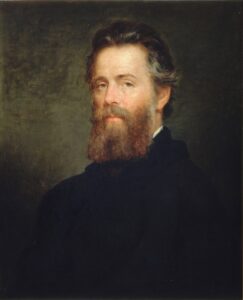
I’ve just re-read my notes on Billy Budd and they’re so good I can see why I liked the book so much: the quotes I lifted from it, the language Melville uses, and the way he himself seems to fall in love with his character, Billy Budd.
It’s a short little book and it was difficult for me to read because it is so dense and poetic, but also archaic. I read four pages or so a day, and on at least two occasions I understood so little of what I read that the next day I had to re-read those pages, and usually that did actually help.
Part of why I liked it is that I love innocence very much, and Melville seems to love it even more. Billy Budd is, of course, very much about innocence. In fact Melville doesn’t seem to shut up about it.
The edition I have, a Ventura Classic, has a summary on the back that I thought was annoyingly vague before I’d read the book, but after I’d read it, I thought it couldn’t have been worded any better, and I wonder very much who wrote it. Was it someone at Ventura? Did it exist already?
Here it is:
“Billy Budd is a tragic story; yet can any story in which innocence is not corrupted be called tragic?
Billy’s character is one of almost divine purity. Perhaps no real man has had his degree of virtue. Claggart is evil as few men are evil. Captain Vere, who is merely human, cannot contend with such forces.
The strength of Billy Budd, however, prevails over all.”
I think it is perfect because it so succinctly and elegantly gets at the heart of the story, which seems, simply, that good and evil are beyond the control and full understanding of we humans, but good, true good, will win the battle. That is, if innocence and purity can stand in for good, and I don’t know if they can.
The other thing I could see in this story is the way evil is drawn to innocence and purity, to try and corrupt it, like an alcoholic is drawn to alcohol to drink it. He can’t resist the pull, so he comes up with all kinds of justifications for why it is right that he doesn’t.
I love how in this story innocence is not corrupted, and prevails in fact, even if the physical form it took—the person of Billy Budd—is no longer.
Is Billy Budd an allegory? The definition of an allegory according to Merriam-Webster reads:
“1: the expression by means of symbolic fictional figures and actions of truths or generalizations about human existence.”
I suppose there is a case to be made that Billy Budd is a symbolic allegory. Merriam-Webster states specifically about the symbolic allegory, as opposed to the personification allegory, that it is an allegory “(…) in which a character or material thing is not merely a transparent vehicle for an idea, but also has a recognizable identity or a narrative autonomy apart from the message it conveys.” That seems to fit Melville’s story.
Considering that in the American Heritage Dictionary Melville’s Moby-Dick is used as an example of an allegory, Billy Budd is too, probably, and yes, when I looked it up on the internet, I got result after result of “Billy Budd is an allegory…”
Seeing these results makes me feel very stupid—as if I was supposed to know that immediately from reading the story. But I never think about these things as I’m reading—so they come upon me slowly, and I have to walk myself there step by step, until here I am.
So yes, I loved the innocence, and I loved it all the more because it is not given to a child or a young woman, but to a young man and moreover to a sailor. Sailors are not who I traditionally would consider to be innocent. In fact, it feels like a contrast, and contrasts are lovely things in writing, in creating friction and tension and something that compels us to look at it.
Melville actually spends quite a few words telling us why sailors are usually more innocent, not less so. In fact, the entirety of chapter XIV is dedicated to emphasizing Billy Budd’s innocence and explaining that sailors in general tend to remain more juvenile, since they’re tucked away on their ships together and come into contact with the rest of the world less than people who aren’t sailors, and that Billy Budd in particular is basically a man-child.
And those are my thoughts on innocence in Billy Budd.
Some expressions I liked from the book (emphasis mine):
“(…) these martial utilitarians may suggest considerations implying that Nelson’s ornate publication of his person in battle was not only unnecessary, but not military (…)”
“(…) whether in a given case, say, the crime proceeded from manis in the brain or rabies of the heart.” (Some other editions have it as “mania in the brain”)
“(…) You have but noted his fair cheek. A man-trap may be under his fine ruddy-tipped daisies.”
And a special mention for Starry Vere’s library, newly replenished whenever he went out to sea, compact but of the best.